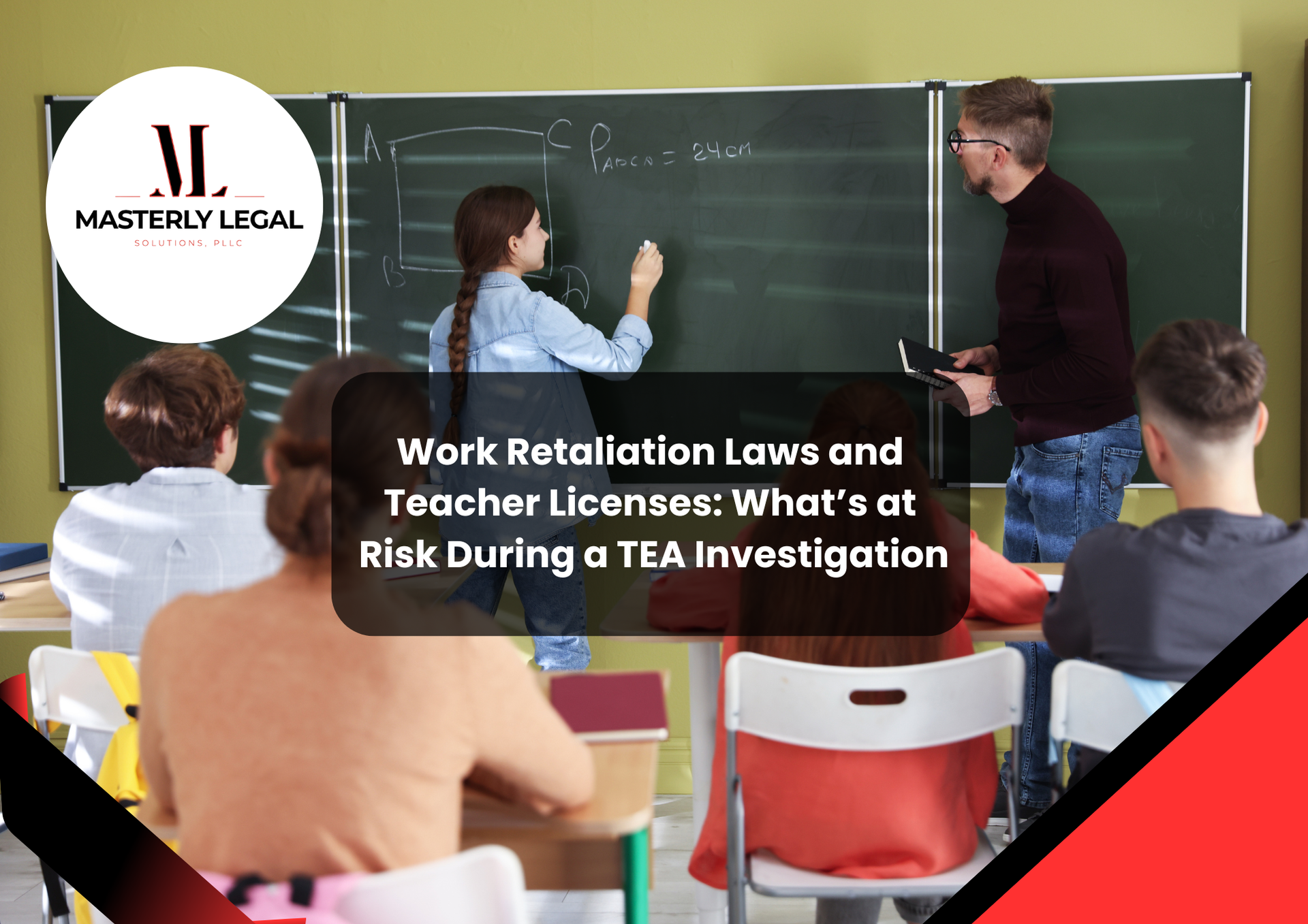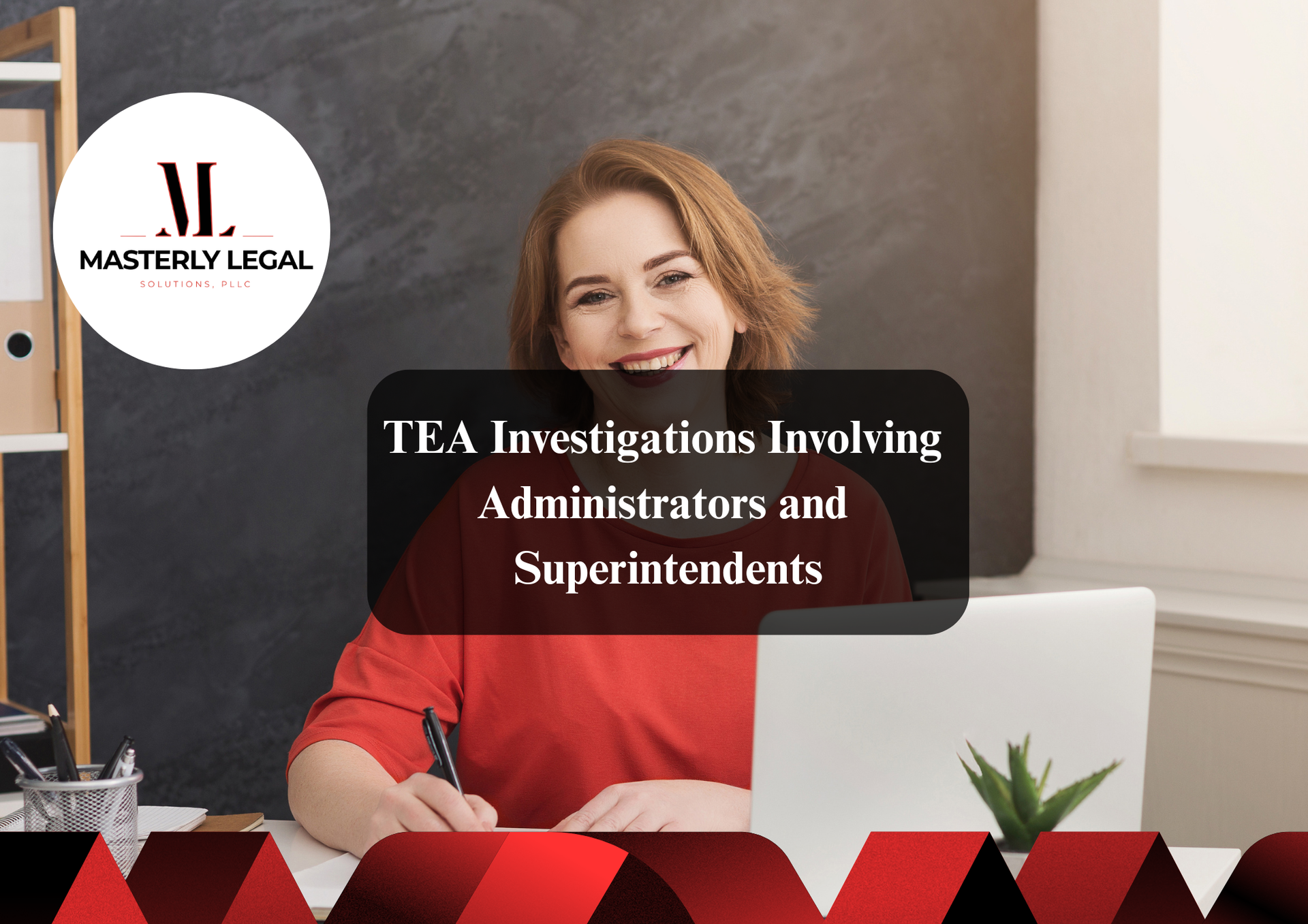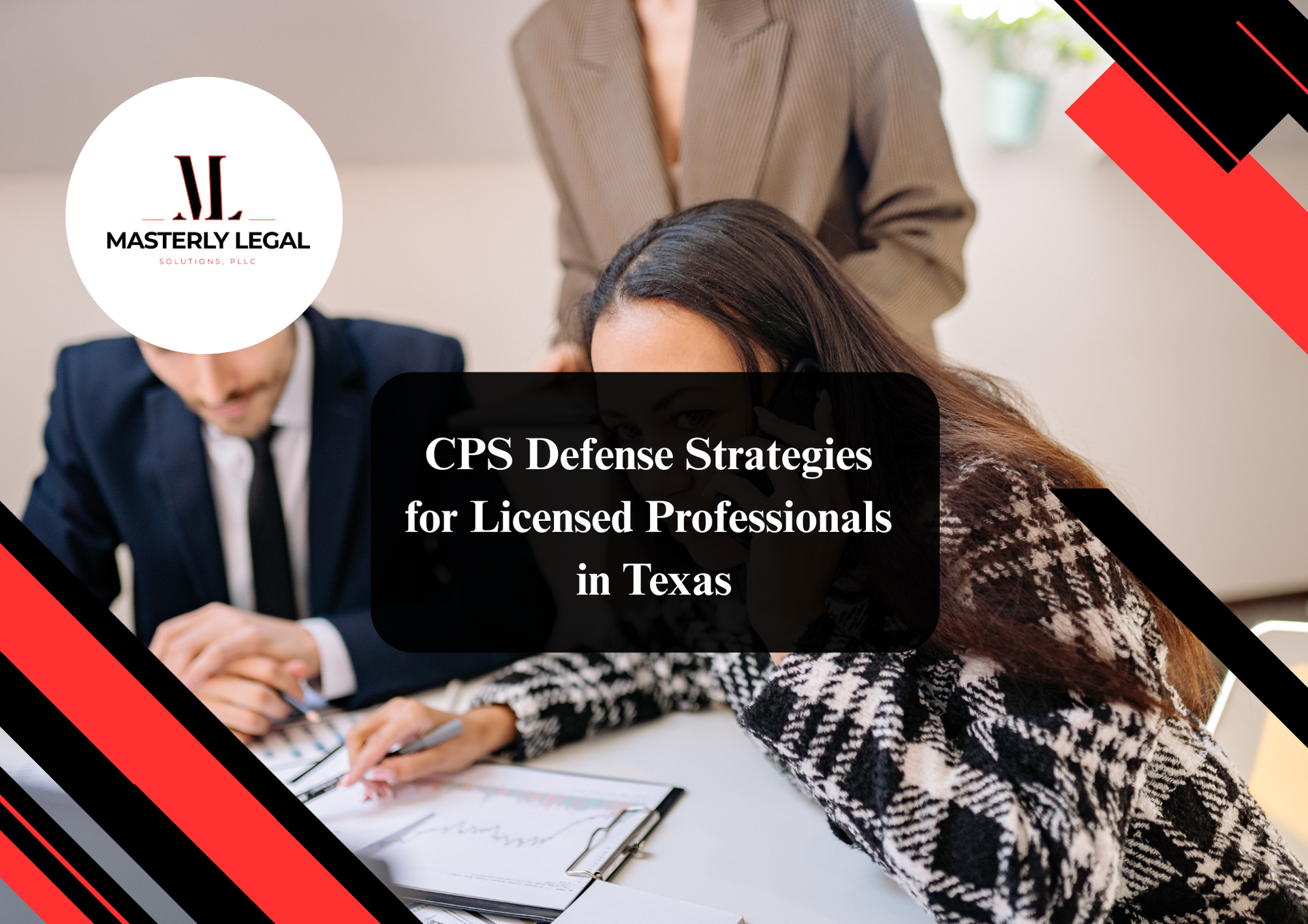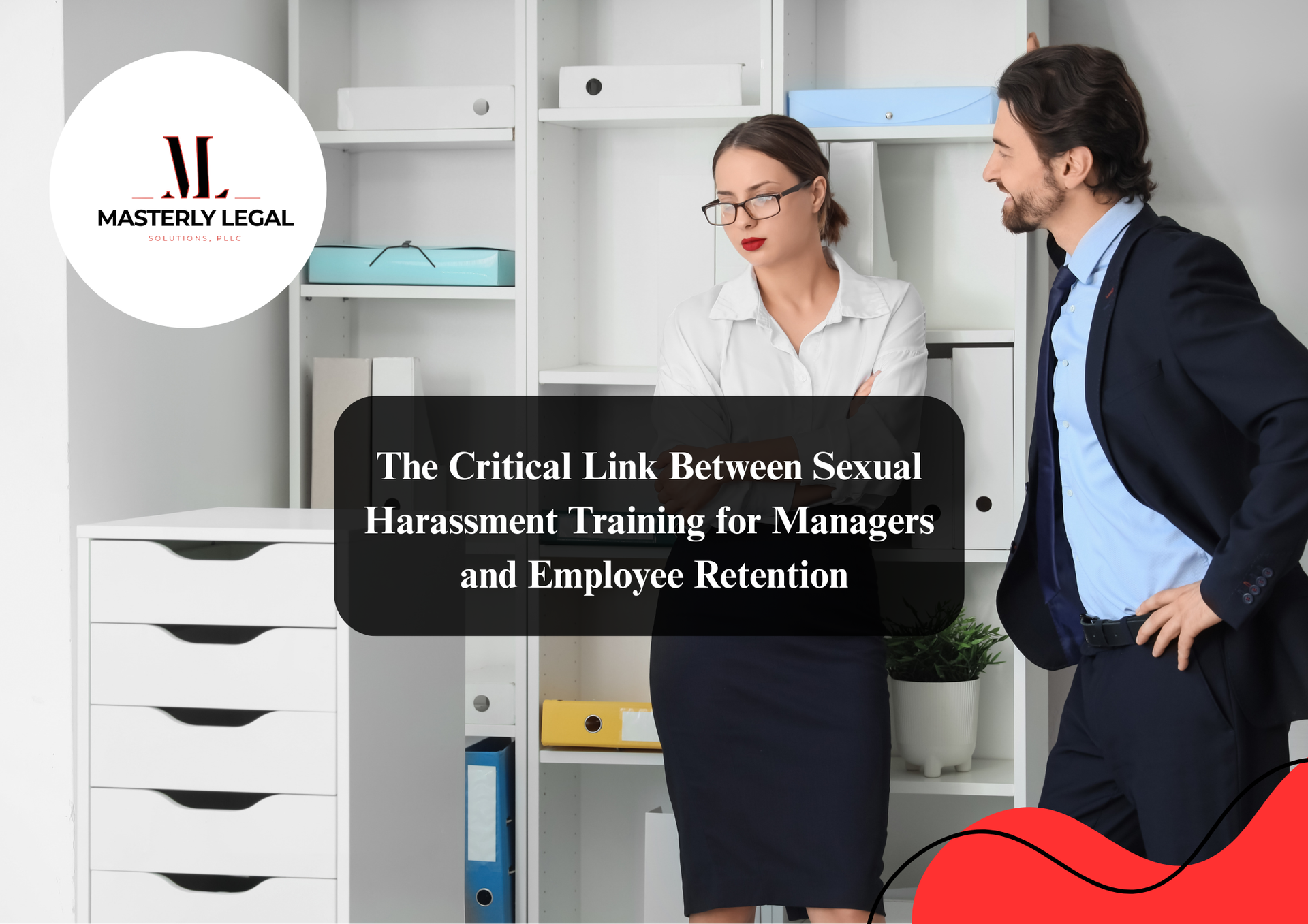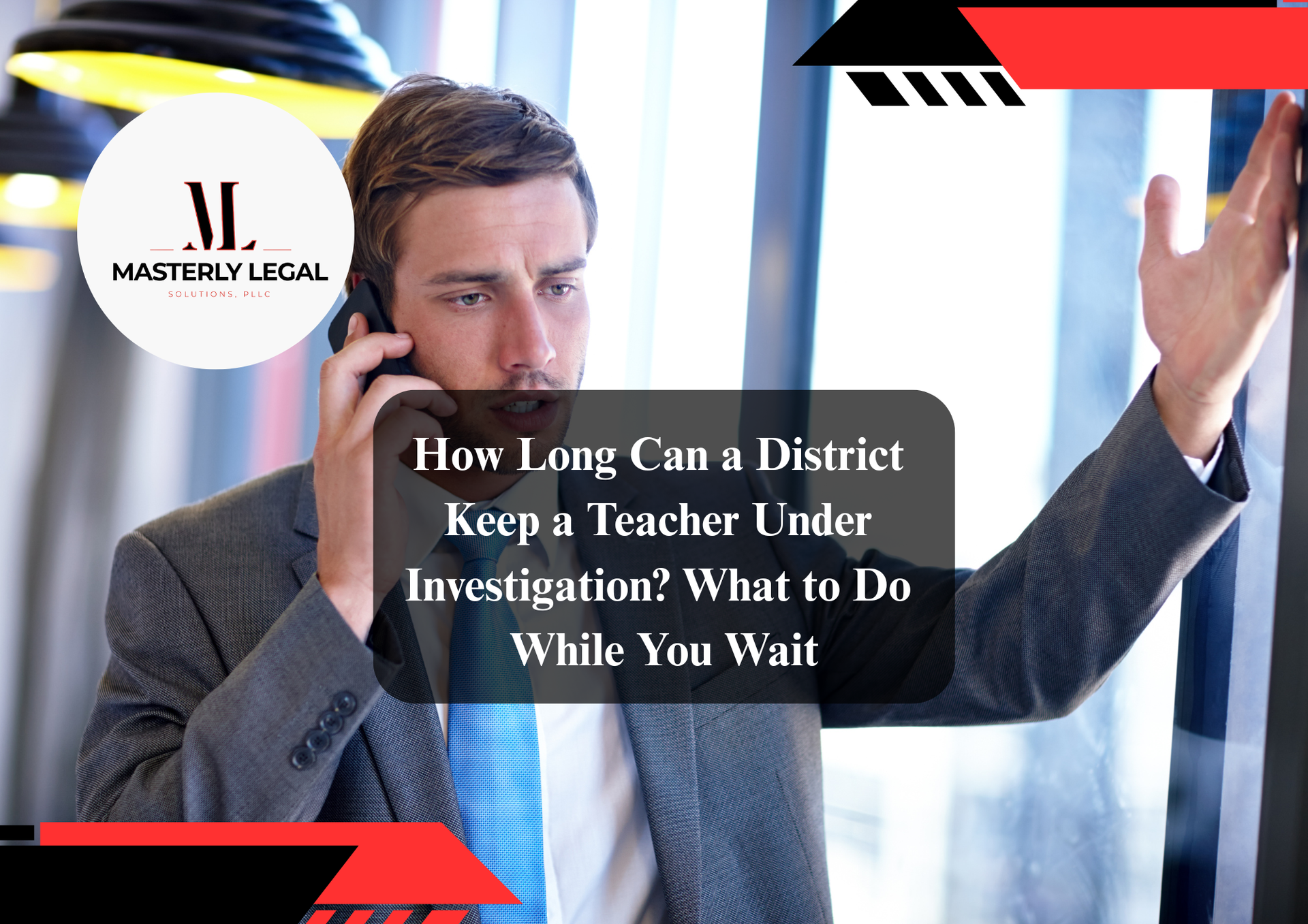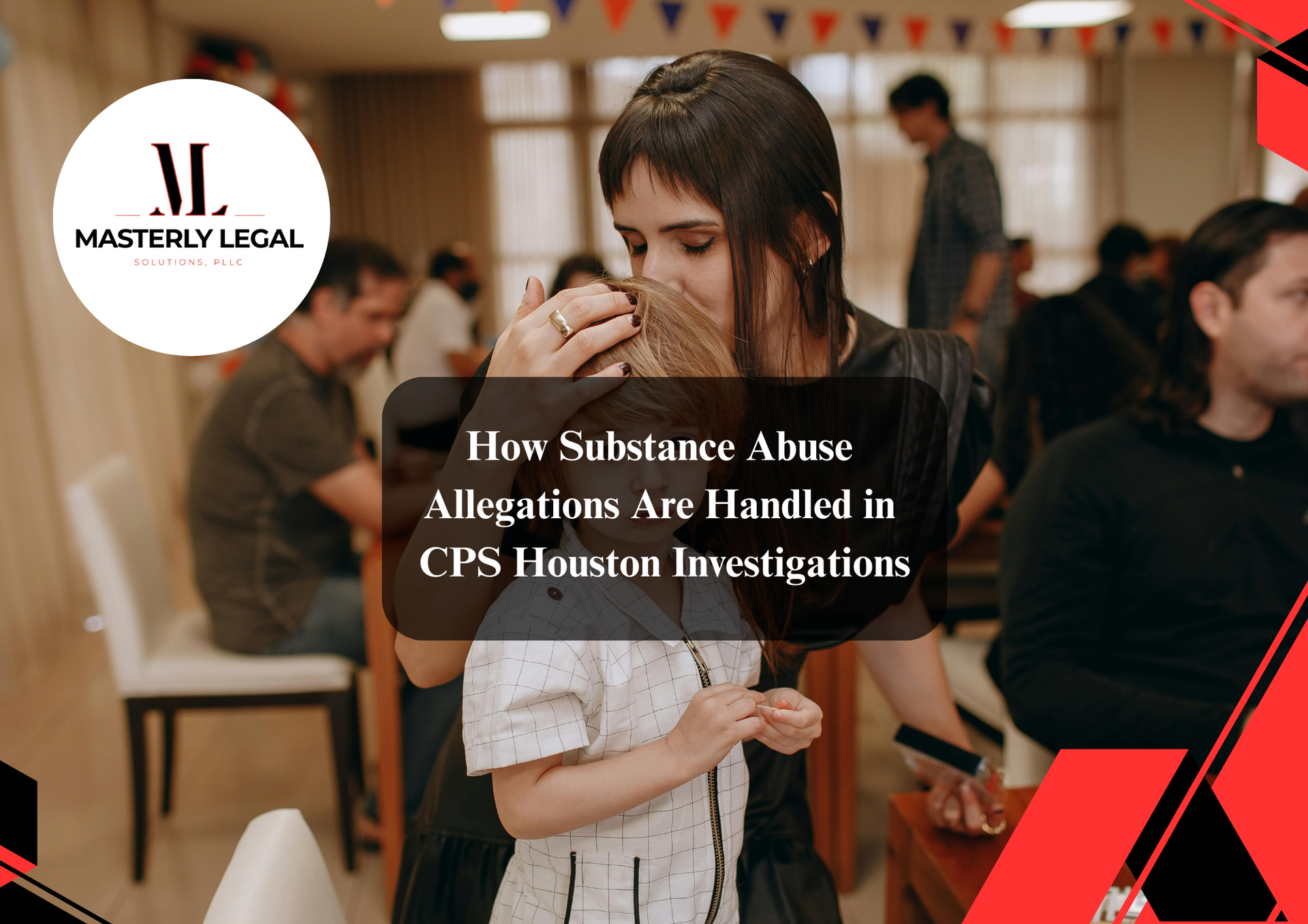The Teacher’s Guide to Handling Administrative Hearings and Investigations
Teachers are at the heart of the education system, yet they face increasing scrutiny from school boards, parents, and state agencies. Administrative hearings and investigations can be daunting—especially when they threaten your license, job, or reputation. At Masterly Legal Solutions, we understand the complex issues educators face and provide tailored legal representation to protect your rights and career.
This comprehensive guide is designed to help educators in public education, private schools, and charter schools understand the legal process of administrative hearings and investigations. It also highlights when it's time to call experienced lawyers for teachers.
Understanding Administrative Hearings in the Education Field
Administrative hearings are legal proceedings typically initiated by school districts, the Texas Education Agency (TEA), or other educational institutions to address alleged misconduct or violations.
What Triggers an Administrative Hearing?
Common reasons for initiating a hearing include:
- Allegations of professional misconduct
- Violations of educator certification standards
- Accusations related to student discipline or abuse
- Complaints from parents or school administrators
- Substance abuse or ethical violations
Educators may also be summoned due to issues related to special education services or concerns under the Rehabilitation Act or Disabilities Education Act.
The Legal Process: What to Expect
Once notified, educators enter a structured process that includes multiple steps. Understanding each phase helps reduce anxiety and ensures better preparation.
The Notification Stage
This includes a formal letter outlining:
- Alleged violations
- Date and location of the hearing
- Rights to legal counsel
- Timeline to respond or contest the charges
Preparing Your Response
Teachers must gather evidence, notify witnesses, and often submit a written reply to the complaint. This is the first opportunity to assert your defense.
The Administrative Hearing Itself
An administrative law judge or panel reviews evidence from both sides. Your education attorney presents arguments, cross-examines witnesses, and challenges the opposition’s claims.
Common Legal Issues Teachers Face
Teachers operate in an environment with evolving education law issues. Missteps—intentional or not—can result in disciplinary hearings.
Frequent Legal Concerns in the Education System:
- Classroom management disputes
- Student discipline
- Accusations regarding sexual orientation or national origin discrimination
- Violation of student rights
- Breach of individualized education plans (IEPs)
- Inappropriate communication on social media
- Alleged violations of special education law
These complex issues often require the support of education law attorneys who understand how to navigate both school policy and state law.
Your Rights as an Educator
Even under investigation, teachers have legal rights guaranteed by state and federal laws.
Key Rights Include:
- Right to due process hearings
- Right to legal counsel during investigations
- Right to access evidence against you
- Right to a fair and impartial hearing
- Right to appeal disciplinary actions
An experienced education lawyer ensures these rights are protected throughout every step of the legal process.
The Importance of Legal Representation
Administrative hearings are not informal chats—they are legal proceedings with significant consequences.
Risks of Representing Yourself:
- Misunderstanding state law or hearing procedures
- Ineffective response to legal accusations
- Missed deadlines or procedural errors
- Inability to challenge evidence effectively
Having legal professionals who specialize in education law matters improves your chances of a favorable outcome.
Handling TEA Investigations with Confidence
The Texas Education Agency oversees educator certification and compliance with state law. A TEA investigation can lead to suspension or revocation of your teaching license.
TEA Investigations Often Involve:
- Misconduct allegations
- Failure to comply with certification requirements
- Breach of ethical standards
- Complaints from parents, administrators, or fellow educators
Education law firms like Masterly Legal Solutions assist Texas teachers in defending their professional standing against such claims.
Special Education and Due Process
Teachers in special education services face heightened scrutiny due to strict compliance with the Individuals with Disabilities Education Act (IDEA).
Common Triggers for Hearings in Special Education:
- Disputes over a child's eligibility for services
- Inadequate implementation of an Individualized Education Plan (IEP)
- Parental complaints regarding special education process compliance
- Lack of documentation supporting special education interventions
Our special education attorneys represent educational professionals to ensure compliance and fair treatment for all parties.
Legal Guidance for Educators in Higher Education
Higher education institutions have their own disciplinary structures, often involving faculty review boards or internal ethics panels.
Professors and Lecturers May Face:
- Academic misconduct accusations
- Claims of discrimination or harassment
- Retaliation complaints related to research or tenure
- Legal concerns related to collective bargaining agreements
An education attorney can safeguard your academic freedom and ensure your contractual rights are respected.
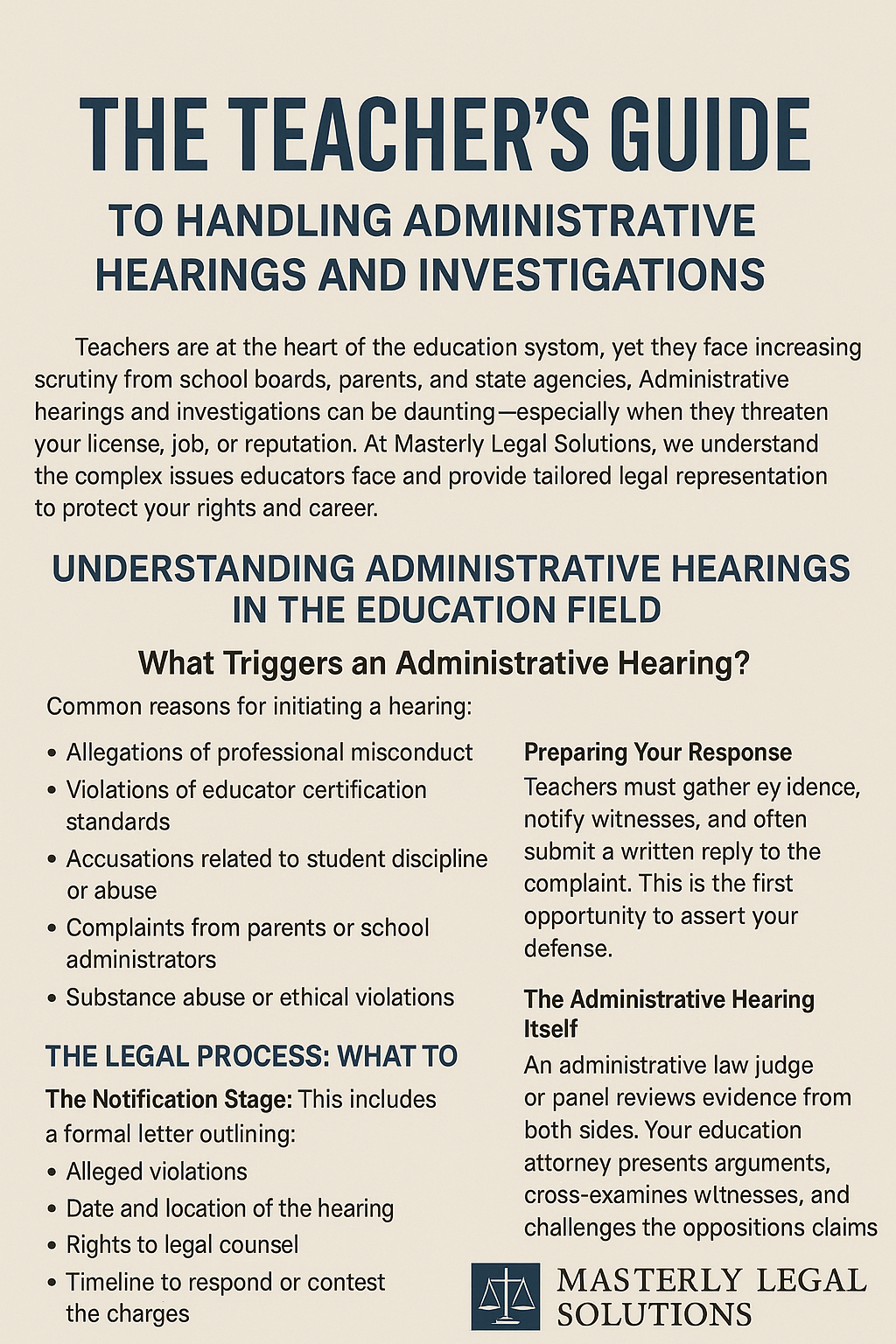
Building a Strong Legal Defense
Proactive defense starts long before the hearing date. Your law firm should help you gather and organize supporting documents and witness statements.
Key Elements of a Strong Defense:
- Thorough review of the allegations
- Collection of relevant emails, messages, and class records
- Testimony from credible witnesses (students, parents, colleagues)
- Analysis of school policies and whether they were violated
This preparation ensures education professionals are fully equipped to respond effectively.
What to Avoid During an Investigation
When emotions run high, simple mistakes can worsen your legal situation.
Avoid These Common Pitfalls:
- Speaking to investigators without legal counsel
- Admitting guilt prematurely
- Discussing the case with coworkers or online
- Ignoring official notices from the education’s office
- Failing to secure documentation
Legal training provides educators with clarity and protection during difficult times.
Charter Schools and Legal Nuances
Teachers in charter schools may face different rules due to varying employment agreements and governance structures.
Legal Issues Specific to Charter Schools:
- Unclear disciplinary procedures
- Lack of union representation
- Flexible but ambiguous standards for dismissal
- Rapid changes in leadership impacting fairness
Legal professionals familiar with charter school systems ensure your case is handled with nuance.
The Role of Education Law Attorneys
Education law attorneys are more than just legal defenders. They understand the educational field deeply, including school finance, teacher evaluations, and student rights.
Education Law Attorneys Provide:
- Strategic legal counsel for complex education law matters
- Representation in administrative and due process hearings
- Advocacy in class action lawsuits involving the education system
- Negotiation assistance with school boards or state board authorities
Their legal training is tailored to address the evolving challenges of the educational field.
Discrimination Claims and Civil Rights Protections
Allegations involving civil rights—including discrimination based on race, gender, sexual orientation, or disabilities—must be handled with great care.
Legal Safeguards for Teachers Include:
- Title VII protections
- Civil Rights Act enforcement
- Rights under the Rehabilitation Act
- Protections against retaliation under federal law
If you're accused or are a victim, legal services ensure your civil rights are not violated in the name of expedience.
Protecting Your Teaching License and Career
Disciplinary hearings can result in license suspension, forced resignation, or permanent revocation. Early legal intervention increases the likelihood of preserving your teaching career.
Consequences of Negative Rulings:
- License revocation
- Ineligibility for future public school employment
- Mandatory reporting to national educator databases
- Damage to professional reputation
Education lawyers offer defense strategies tailored to the complexities of state board licensing actions.
Representing Clients Across All School Systems
Masterly Legal Solutions represents clients from all educational institutions, including:
- Public school districts
- Private schools
- Charter schools
- Higher education institutions
- Alternative learning environments
We tailor our approach to the structure, rules, and governance of each system, ensuring educators receive fair treatment across the board.
How Legal Counsel Supports Education Reform
Lawyers for teachers don’t just defend individual cases. They influence broader education reform through litigation, policy advocacy, and support for fair disciplinary practices.
Contributions to Reform Include:
- Promoting clearer standards for educator discipline
- Challenging unfair dismissal policies
- Advocating for teacher protections under collective bargaining agreements
- Ensuring schools comply with federal education law
This work reinforces fairness and accountability within the education system.
Helping Educational Professionals Navigate Legal Complexity
Education professionals deserve legal representation from attorneys who understand the intricacies of teaching, student needs, and state regulations.
Our law firm specializes in guiding educators through every stage of legal proceedings—from initial notice to final appeal.
When to Contact an Education Attorney
If you're under investigation, facing termination, or simply unsure about your legal standing—don’t wait. Delaying action can limit your defense options.
Reach Out to a Lawyer If:
- You receive a notice from the TEA or your school administrator
- You’re invited to a due process hearing
- Your actions regarding a student with disabilities are being questioned
- You’ve been accused of discrimination or misconduct
- Your educator certification is under review
Having the right legal counsel early on provides a critical advantage.
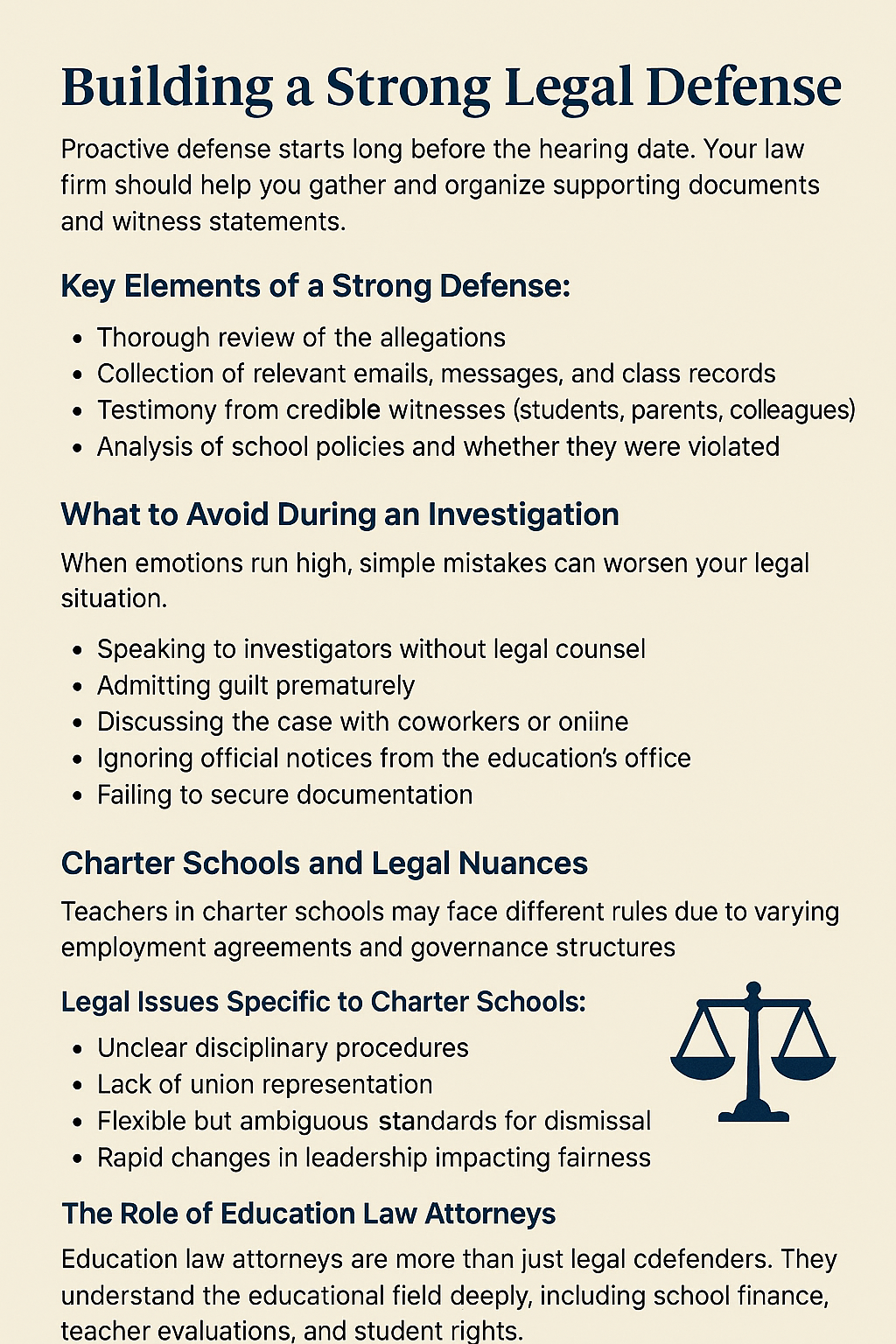
Advocating Within the Legal Profession: Supporting Teachers Representing Students in Special Education Matters
In today’s educational landscape, teachers are often placed in the unique position of representing students, especially those requiring specialized services under the Disabilities Act and other federal protections. When a dispute arises over a child's special education plan or eligibility, teachers may be called to testify, defend their actions, or clarify their instructional choices during administrative hearings. This is particularly true in cases involving individualized education programs (IEPs) or disputes about accommodations and services. Understanding how the legal profession intersects with the classroom empowers educators to uphold both compliance and student rights. Having legal support during these proceedings ensures that both the educator’s responsibilities and the child’s needs are fairly addressed within the structure of the law.
Safeguarding the Rights of Texas Teachers in Administrative Proceedings
In Texas, educators are held to high standards of conduct, and the Texas Education Agency (TEA), through the State Board for Educator Certification (SBEC), oversees investigations into alleged misconduct. When a teacher faces an administrative hearing, it's crucial to understand the process and the rights afforded under state law.S
Administrative hearings are formal proceedings where evidence is presented before an administrative law judge. Teachers have the right to be represented by legal counsel, to present evidence, and to cross-examine witnesses. The outcomes of these hearings can range from reprimands to suspension or revocation of teaching certification.
Given the potential impact on a teacher's career, seeking experienced legal representation is advisable. Education law attorneys can navigate the complexities of the administrative process, advocate on behalf of the educator, and work towards a favorable resolution.
Understanding and exercising one's rights during administrative hearings is essential for Texas teachers to protect their professional standing and continue their vital role in education.
Understanding Legal Matters in the Educational Field
Educators frequently encounter a variety of legal matters that can significantly impact their professional lives. These issues may arise from allegations of misconduct, disputes over employment terms, or challenges related to student rights and accommodations. Navigating these complexities requires a solid understanding of education law and the protections it affords.
In the context of administrative hearings and investigations, it's crucial for teachers to be aware of their rights and the procedures that govern such processes. For instance, educators are entitled to due process, which includes the right to be informed of allegations, access to evidence, and the opportunity to present a defense . Legal representation can be invaluable in these situations, ensuring that teachers' rights are upheld and that they receive fair treatment throughout the proceedings.
Moreover, staying informed about changes in education law and seeking timely legal advice can help educators proactively address potential issues before they escalate. By understanding the legal landscape of the educational field, teachers can better protect their careers and continue to provide quality education to their students.
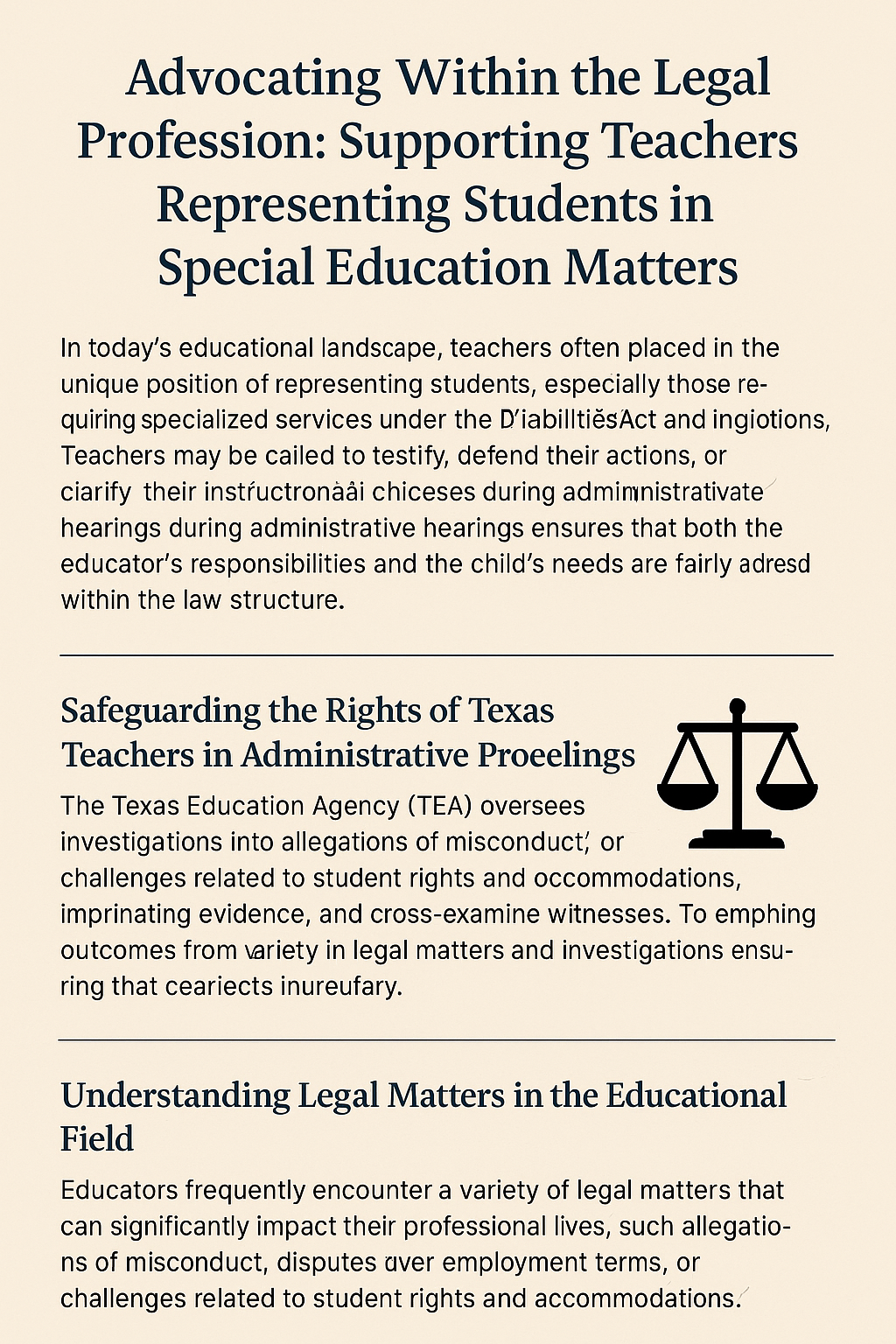
Collective Legal Action: Class Action Lawsuits in the Education Field
In the education field, class action lawsuits serve as a powerful tool for addressing systemic issues that affect large groups of educators, students, or parents. These legal actions consolidate similar individual claims into a single lawsuit, aiming to rectify widespread problems within educational institutions.
For instance, in New Jersey, a significant class action lawsuit was filed against the Department of Education for failing to comply with the Individuals with Disabilities Education Act's (IDEA) 45-day rule for resolving special education disputes. The settlement mandates timely decisions in special education cases, benefiting over 5,000 children with disabilities and their families .
Similarly, in New York City, the case of J.S.M. v. New York City Department of Education addressed delays in special education hearings. The settlement requires systemic changes to ensure timely decisions, directly impacting students with disabilities who rely on prompt educational support .
These examples underscore how class action lawsuits can lead to substantial reforms in the education system, ensuring that legal obligations are met and that students and educators receive fair treatment.
Addressing Complex Issues Related to Administrative Hearings
Administrative hearings in the educational context often involve issues related to compliance with federal and state laws, educator conduct, and the provision of appropriate services to students. These hearings can be complex, requiring a thorough understanding of the legal framework governing education.
Educators may face hearings due to allegations of misconduct, disputes over employment terms, or challenges related to student rights and accommodations. For example, a teacher might be involved in a hearing concerning the adequacy of services provided under a student's Individualized Education Program (IEP).
Navigating these issues necessitates careful preparation, including gathering relevant documentation, understanding procedural rights, and, often, seeking legal counsel. Legal professionals specializing in education law can provide invaluable assistance in addressing these matters, ensuring that educators' rights are protected and that they can effectively respond to the challenges presented in administrative hearings.
Navigating Legal Matters in the Education Field
Educators operate within a complex legal landscape where understanding and addressing legal matters is crucial. From employment disputes to compliance with educational regulations, teachers must be prepared to handle various legal challenges that may arise in their professional journey.
In the education field, legal issues can encompass a wide range of scenarios, including allegations of misconduct, disputes over employment terms, and challenges related to student rights and accommodations. Navigating these complexities requires a solid understanding of education law and the protections it affords.
When facing administrative hearings or investigations, educators need to be aware of their rights and the procedures that govern such processes.
For instance, educators are entitled to due process, which includes the right to be informed of allegations, access to evidence, and the opportunity to present a defense. Legal representation can be invaluable in these situations, ensuring that teachers' rights are upheld and that they receive fair treatment throughout the proceedings.
Moreover, staying informed about changes in education law and seeking timely legal advice can help educators proactively address potential issues before they escalate. By understanding the legal landscape of the educational field, teachers can better protect their careers and continue to provide quality education to their students.
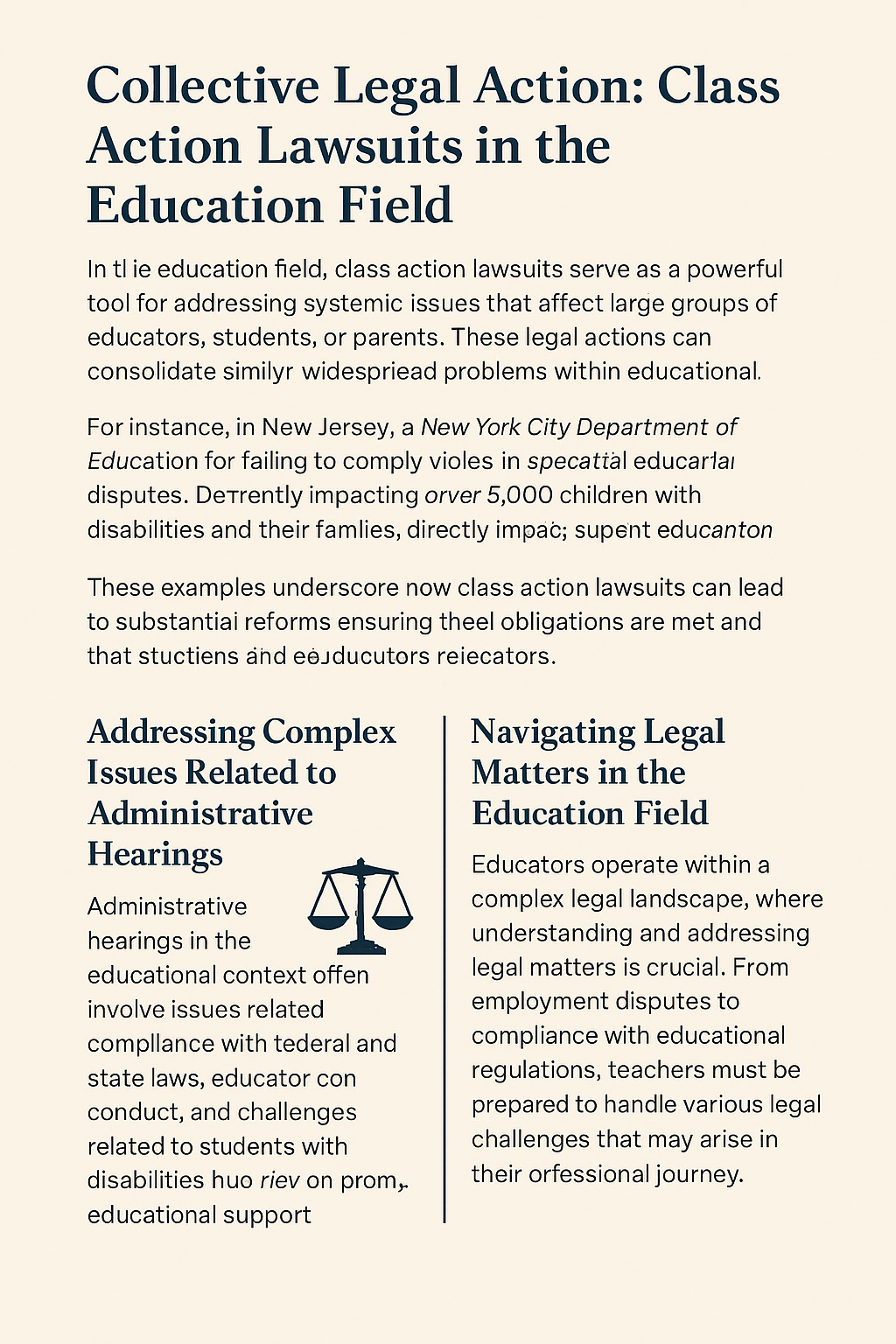
Navigating Special Education Law in Administrative Hearings
Understanding special education law is critical for teachers involved in administrative hearings, especially when the matter concerns a student's right to appropriate services. This body of law ensures that students with disabilities receive a free and appropriate public education (FAPE) under the Individuals with Disabilities Education Act (IDEA). Educators play a central role in implementing and documenting these services through Individualized Education Programs (IEPs).
When disputes arise—such as disagreements over a child’s eligibility, placement, or the adequacy of services—teachers may be required to present records, explain educational decisions, and defend their compliance with legal mandates. Being well-versed in special education law not only protects the rights of the student but also safeguards the educator from allegations of non-compliance. Legal representation can be essential in clarifying these responsibilities and presenting a strong, lawful defense.
Handling Legal Issues in the Field of Education
Educators operate within a complex legal landscape where understanding and addressing legal matters is crucial. From employment disputes to compliance with educational regulations, teachers must be prepared to handle various legal challenges that may arise in their professional journey.
In the education field, legal issues can encompass a wide range of scenarios, including allegations of misconduct, disputes over employment terms, and challenges related to student rights and accommodations. Navigating these complexities requires a solid understanding of education law and the protections it affords.
When facing administrative hearings or investigations, it's essential for educators to be aware of their rights and the procedures that govern such processes. For instance, educators are entitled to due process, which includes the right to be informed of allegations, access to evidence, and the opportunity to present a defense. Legal representation can be invaluable in these situations, ensuring that teachers' rights are upheld and that they receive fair treatment throughout the proceedings.
Moreover, staying informed about changes in education law and seeking timely legal advice can help educators proactively address potential issues before they escalate. By understanding the legal landscape of the educational field, teachers can better protect their careers and continue to provide quality education to their students.
Gathering Evidence: A Crucial Step in Administrative Hearings
When educators face administrative hearings, the process of gathering evidence becomes a pivotal component of their defense strategy. Proper documentation and evidence collection can significantly influence the outcome of a hearing, making it imperative for teachers to approach this step with diligence and precision.
Key elements in evidence gathering include:
- Documenting Events: Maintain detailed records of incidents, communications, and any relevant interactions that pertain to the case.
- Collecting Supporting Materials: Gather emails, reports, student records, and any other documents that can substantiate your position.
- Identifying Witnesses: List individuals who can provide testimony or statements that support your account of events.
- Consulting Legal Counsel: Work with an attorney to ensure that the evidence collected is admissible and effectively presented during the hearing.
Engaging in thorough evidence gathering not only strengthens your defense but also demonstrates a proactive and organized approach to addressing the allegations. With the support of legal professionals, educators can navigate the complexities of administrative hearings and work towards a favorable resolution.
Free Consultation with Masterly Legal Solutions
If you're a teacher or education professional facing disciplinary action, an investigation, or any legal matters impacting your career, Masterly Legal Solutions is here to help. They also offer comprehensive HR consulting services aimed at minimizing workplace disputes.
Our experienced attorneys provide compassionate, confidential guidance to educators across Texas. Whether you work in public schools, private institutions, or higher education, we offer personalized legal services that protect your future.
Don’t try to handle complex legal processes alone. Contact us at (972) 236-5051 for a free consultation—we’ll listen, advise, and fight for your rights every step of the way.
Disclaimer: This article is for informational purposes only and does not constitute legal advice. For guidance specific to your situation, please consult a licensed education attorney.
Looking for Legal & Business Solutions? Contact Us Now
Fill in the form or call us to set up a meeting

